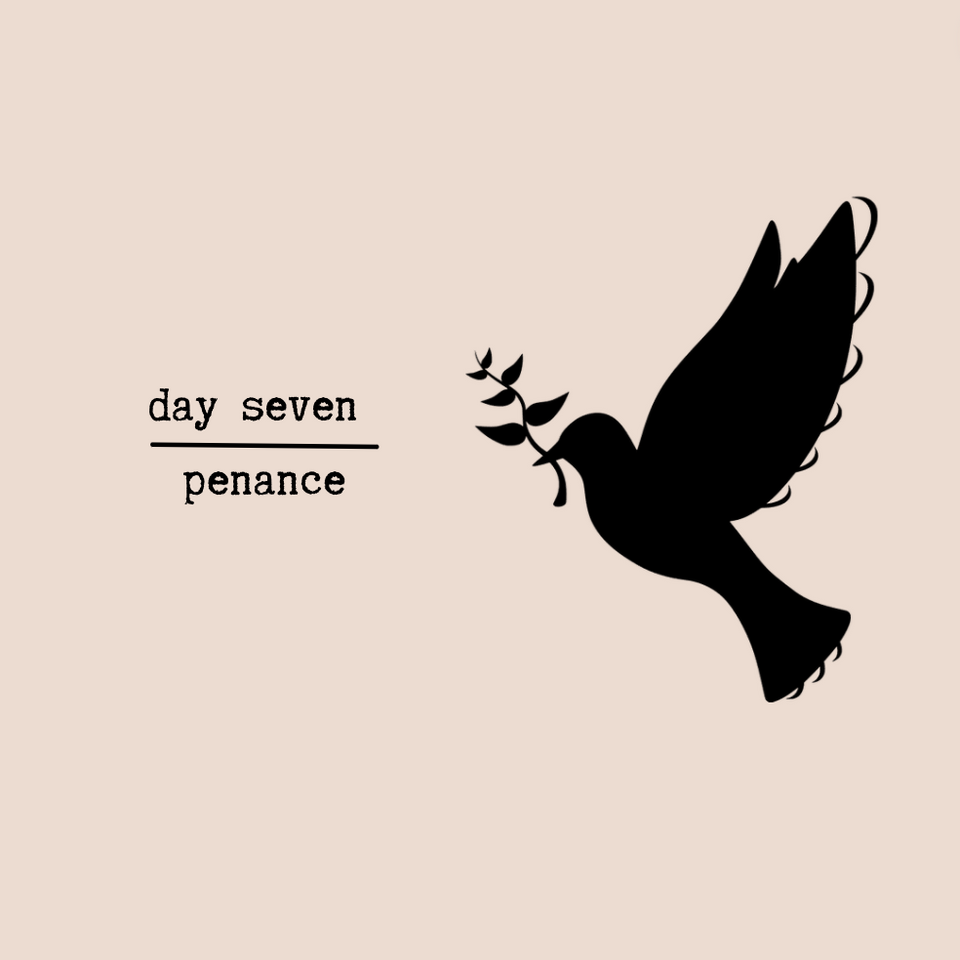Day Seven - Penance


Today's Reflection
by Henry Niemeyer
In today’s Gospel, which is taken from Matthew 25:31-46, Jesus stated, “And the king will say to them in reply, ‘Amen, I say to you, whatever you did for one of these least brothers of mine, you did for me.'"
The concept of penance is viewed as archaic or even obsolete in the eyes of many Christians, yet its call and message remain ever-present, and with renewed poignance in the world of today. Penance is certainly not a pleasant thought, but its necessity in the Christian life is beyond dispute. It is both healing for the soul, and a necessary weapon with which to engage the world. But before we can discuss the virtue of penance as it applies to us today, we must first establish what it is.
St Thomas Aquinas defines it at its most basic level as "to deplore [lament, sorrow over] something one has done." He then goes on to make an important distinction: sorrow, in the context of penance, takes two forms. The first is as an emotion or passion. This is not the virtue of penance which we here discuss. The second form sorrow can take is an act of the will. As an act of the will, penance or sorrow is rightly classified as a virtue.
At this point, you may be wondering how on earth sorrow can be an act of the will, thus being elevated to a virtue. If sorrow isn't an emotion, then what is it?
A little further along in the passage, St. Thomas says something which helps to clear up this confusion: "in the penance of which we are speaking now ... the penitent assumes a moderated grief for his past sins, with the intention of removing them." Yes, sorrow as an emotion does play a role in the virtue of penance, but only insofar as it drives the will to make actual choices towards resolving that from which the sorrow stems.
This makes marginally more sense, but what choices can be made? After all, penance looks to an evil already committed, so there's nothing we can do to change what has already occurred, right?
Well, that isn't precisely true.
See, the grief isn't actually looking to the evil that was committed. If I'm truly penitent for stealing money from a friend, it's not the actual confiscation of the physical bills for which I'm penitent. The harm I inflicted upon them and the damage I dealt to my relationship with them is the source of the grief. The same principle applies to God.
So now we have something somewhat less abstract and more tangible. Penance is the will working to repay God for the offenses we've committed against Him and attempting to restore our relationship with Him.
This can take many forms. Historically, we've seen the saints practice Prayer, Fasting and Almsgiving (the Triforce of Lent), as well as other forms of self-mortification as penance.
As St. Thomas says elsewhere, "the weakness of the natural good is cured when a man abstains from bad things and accustoms himself to good ones: by subjecting his spirit to God in prayer, or by taming his flesh by fasting to make it subject to the spirit, and in external things by uniting himself by giving alms to the neighbors from whom his fault had separated him."
At this point, we’ve got a pretty good working sense, if not definition, of what penance is. Now for the real question: what does this have to do with anything? Penance is a personal affair, conducted between oneself and God, and we can use it to sanctify and purify ourselves. Simple enough, right?
Wrong.
The role of penance in the life of the faithful is actually far richer than that. But, I bet you’re tired of hearing me talk, so I’ll let Pope Pius XI explain it for you:
Penance then is, as it were, a salutary weapon placed in the hands of the valiant soldiers of Christ, who wish to fight for the defense and restoration of the moral order in the universe. It is a weapon that strikes right at the root of all evil, that is at the lust of material wealth and the wanton pleasures of life. By means of voluntary sacrifices, by means of practical and even painful acts of self-denial, by means of various works of penance, the noble-hearted Christian subdues the base passions that tend to make him violate the moral order. But if zeal for the divine law and brotherly love are as great in him as they should be, then not only does he practice penance for himself and his own sins, but he takes upon himself the expiation of the sins of others, imitating the Saints who often heroically made themselves victims of reparation for the sins of whole generations, imitating even the divine Redeemer, who became the Lamb of God "who taketh away the sins of the world" (lo. i. 29).
[~Pope Pius XI]
How amazing is that? We can, through penance, join in Christ’s redemptive work by actually taking upon ourselves a part of the temporal punishment due to others for their sins.
The effect of this goes beyond simply paying for their sins. Penance has long been practiced alongside prayer, in order to lend it more force. You may recall the evil spirit in the gospel (Mark 9:16-28) that needed to be driven out by “prayer and fasting.”
So what is the takeaway from all this?
This Lent, as you practice your prayer, fasting, and almsgiving, it’s paramount that you remember that it’s not only for self-mortification, but for the souls of others as well. Strive to do penance in the spirit of “zeal for the divine law and brotherly love,” and thereby to join it to Christ’s redemptive sacrifice on the cross. Who knows, perhaps your penance this lent could save the lives of hundreds, born and unborn.
Prayer for Forgiveness
God, I thank you for your abundant mercies. No sin of mine is beyond your power to forgive, and your forgiveness has restored my soul to friendship with you. Thank you for never ceasing to love me even when my actions show that I do not love you fully. Thank you for seeking me out as the shepherd seeks the lost sheep.
Help me to be truly sorry for my sins. This Lent, allow each act of penance to atone for my sins. Help me to grow in love of You, and let each act of penance be an offering for the souls of others, especially the most vulnerable.
Amen.
